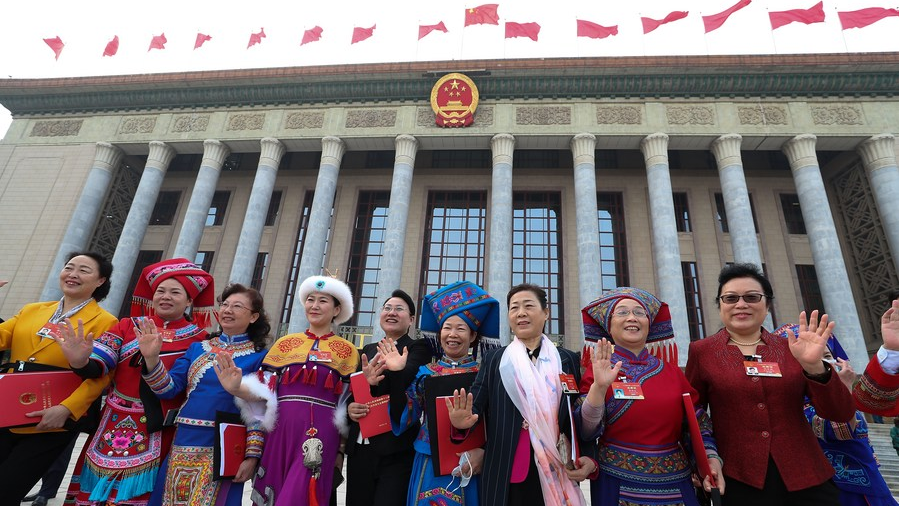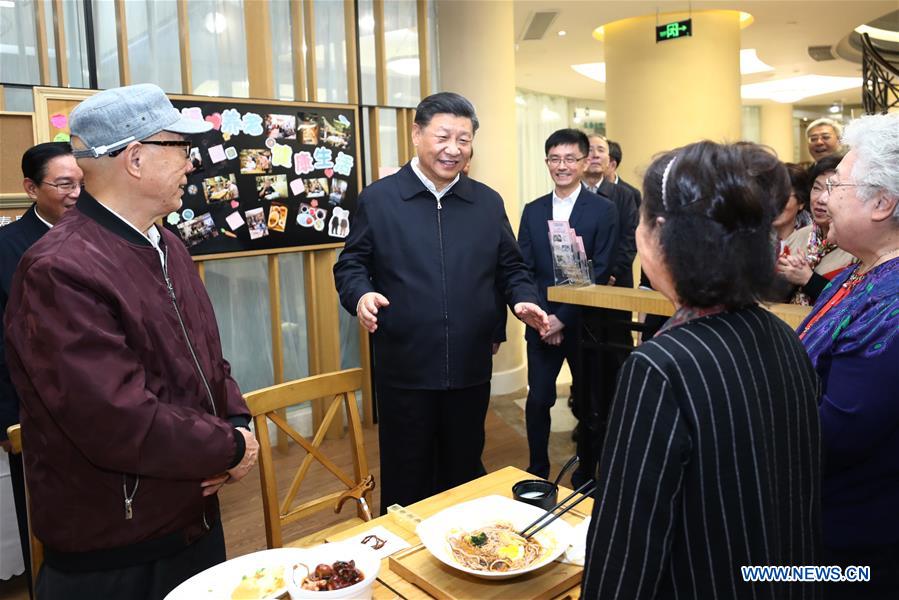
Deputies to the 13th National People's Congress (NPC) leave the Great Hall of the People after the closing meeting of the fourth session of the 13th NPC in Beijing, capital of China, March 11, 2021. /Xinhua
Deputies to the 13th National People's Congress (NPC) leave the Great Hall of the People after the closing meeting of the fourth session of the 13th NPC in Beijing, capital of China, March 11, 2021. /Xinhua
Editor's note: Koh King Kee is president of Centre for New Inclusive Asia, director of the China Belt and Road Desk, Baker Tilly Advisory Malaysia, and president of Dr Wu LIen-Teh Education Society, Malaysia. The article reflects the author's opinions and not necessarily the views of CGTN.
Democracy is a shared value of humanity. No one will dispute this, as democracy is a common value cherished by all mankind which transcends cultures and cuts across borders.
Democracy is sacrosanct. A country that is undemocratic is regarded as a pariah in the global system.
However, the definition and interpretation of democracy have long been the monopoly of the West, as democracy is a political system that originated from the West. The West, therefore, assumes it is its prerogative to set the criteria for democracy and the rest of the world is to follow.
The United States, which is the sole global superpower since the collapse of Soviet Russia, regards itself as the guardian of democracy. It acts both as the prosecutor and the judge of democracy, defines which country is deemed democratic and which one is not, unabashedly to further its geopolitical interests.
On December 9 and 10, U.S. President Joe Biden will host a virtual "Summit for Democracy" with selected countries on the themes: strengthening democracy and countering authoritarianism, fighting corruption, and promoting respect for human rights. The motives and intent of the summit are obvious.
The word democracy comes from the Greek words "demos," meaning people, and "kratos" meaning power; so democracy can be interpreted as "people's power." In Chinese, the term for democracy is "民主" (minzhu), meaning "the people are masters."
There are various forms of Western democracy: the parliamentary democracy which is also known as the Westminster model, the presidential system, or a hybrid of the two. Irrespective of its form, the common characteristic of Western democracy is periodic election of government, either through a proportional voting system or a majoritarian system.
No democracy is perfect. However, Western democracy is often the game of the rich and the powerful. The poor, who often constitute the majority of the population, have little chance of getting their voices heard, other than through their elected representatives who may or may not act to protect their interests.
Party politics is inherent in Western democracy and in a general election, typically the winner takes all. Party conflicts are difficult to reconcile and the interests of the minority are often overlooked.
Vote-rigging in parliamentary elections could happen and vote buying is not uncommon. The ruling party could take advantage of being the incumbent to prolong its rule with policies favoring its vote banks. Or resorting to gerrymandering, that is, manipulate the boundaries of electoral constituencies to gain advantage in elections.
Politicians may play up populist, racist or extreme religious sentiments to garner votes which will divide the society. The aftermath of America's 2020 presidential election is a vivid example of how party politics could tear apart the society, even turning friends into foes due to different political orientations.
Disparity in electorate between constituencies could also result in a political party controlling majority parliament seats, which may actually have not obtained majority popular votes. In Malaysia, for example, such disparity can be as big as nine times. This means effectively in an election, a single vote in a small constituency is as good as nine votes in a large constituency.
In America's presidential election, a majority in popular votes is no guarantee to the presidency as the U.S. president is elected by the electors of the Electoral College. The presidential candidate who receives a majority of the electoral votes wins the election, not the one who wins in terms of popular votes. Trump won the 2016 U.S. presidential election even though he received 2.8 million lesser popular votes than Hillary Clinton. Likewise in the 2000 presidential election, Al Gore lost to George Bush though he received more popular votes than Bush.
Democracy is a means, not an end. It is a means to bring good life to all citizens. Democracy should not exist just in form, it has to be substantive. Democracy should be a complete process with wide and continual participation by the people with the objective of bringing about better life for all. Democracy is not just for show during elections.

Chinese President Xi Jinping visits the Gubei civic center in Changning District of Shanghai, E China, November 2, 2019. /Xinhua
Chinese President Xi Jinping visits the Gubei civic center in Changning District of Shanghai, E China, November 2, 2019. /Xinhua
As the late former UN Secretary-General Kofi Annan said: "Democracy includes far more than just elections, and it really makes more sense to think about the will of the people idea, rather than about institutional or voting structures, when we are trying to assess how democratic a country is."
During an inspection tour in Shanghai in 2019, President Xi Jinping said China's political system is "a whole-process democracy." It encompasses the idea that China's one-party political system is a unique application of democratic principles, "one which empowers the people to get involved in the country's decision-making and governance at all levels," which is more participatory than Western democratic systems.
The "whole-process people's democracy," as it is now known, is in fact rooted in the people-centered governance principle of the Communist Party of China (CPC). China's democracy is people's democracy. The people as masters of the country are the essence and core of Chinese democracy.
In his speech commemorating the centennial of the CPC, President Xi said, "On the journey ahead, we must rely closely on the people to create history, uphold the Party's fundamental purpose of wholeheartedly serving the people," and "develop whole-process people's democracy, safeguard social fairness and justice, and resolve the imbalances and inadequacies in development and the most pressing difficulties and problems that are of great concern to the people."
China is a vast country with 1.4 billion people. It is a daunting task to reach out to every group of people, from villages, towns and cities to autonomous regions and municipalities.
The whole-process people's democracy enables the Chinese people to broadly and continually participate in the day-to-day political activities at all levels, including democratic elections, political consultation, decision-making and oversight, covering the most number of people in the most effective way.
China's whole-process democracy focuses on consensus building, in contrast to the prolonged and protracted bargaining by interest groups to arrive at a decision which is a distinctive feature of Western democracy. It is a complete system with supporting mechanisms and procedures, and has been fully tested through wide participation. It integrates two major democratic models – electoral democracy and consultative democracy.
It is more robust as the participants come from all walks of life, not confined to a small elite group of the rich and the powerful. It is more representational as even a foot masseuse can be a deputy at the top national legislature, not just the elitists.
There is no one-size-fits-all model of democracy in the world. "One person, one vote" is just one form of democracy, and is by no means the only model of democracy. Whether a country is democratic or not depends not just on whether the people have the right to vote, but more importantly, whether they have extensive participation in the country's decision-making and governance process.
China did not duplicate the Western model of democracy, but created its own. It operates a democratic system covering a population of more than 1.4 billion, consisting of 56 ethnic groups across the country, making possible wide and sustained participation of its entire people.
The whole-process people's democracy has distinctive Chinese characteristics. It works well for China. It is China's contribution of ideas and solutions to the political progress of humanity.
(If you want to contribute and have specific expertise, please contact us at opinions@cgtn.com.)

